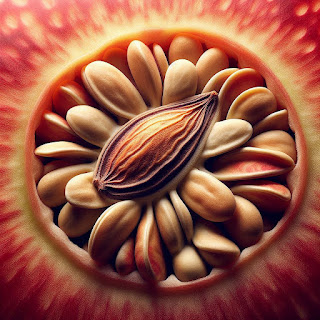Are Apple Seeds Poisonous?
Are Apple Seeds Poisonous? Unveiling the Truth Behind the Myth
The apple, an iconic symbol of health and well-being, is a staple in diets around the world. Yet, lurking within this beloved fruit is a small, often overlooked component that has sparked curiosity and concern: the seeds. Many people have heard whispers about the potential dangers of apple seeds, but are they really poisonous? Let's dive into the science and folklore to uncover the truth.
The Seed of Doubt: Why the Concern?
The concern about apple seeds being poisonous stems from the presence of a compound called amygdalin. Amygdalin is a cyanogenic glycoside, which means it can release cyanide, a potent toxin when metabolized. Cyanide is infamous for its deadly effects on the human body, as it can interfere with the body's ability to use oxygen, potentially leading to fatal outcomes.
How Much Cyanide is in an Apple Seed?
The amount of amygdalin in apple seeds can vary depending on the apple variety, but on average, a single seed contains about 0.6 mg of amygdalin. When metabolized, this can produce a very small amount of cyanide. To put this into perspective, it would take a significant number of apple seeds to reach a dangerous level of cyanide exposure for an adult. Estimates suggest that an average adult would need to consume around 150 to several thousand crushed seeds to reach a lethal dose, depending on the individual's weight and overall health.
The Role of the Body's Natural Defenses
Our bodies are equipped with natural defenses that help mitigate the risk of cyanide poisoning from small exposures. Enzymes in the liver, such as rhodanese, convert cyanide into thiocyanate, a much less toxic compound that is then excreted in the urine. This detoxification process helps protect us from small, incidental exposures to cyanide from various dietary sources, including apple seeds.
Practical Considerations: Should You Worry?
For the average apple eater, the risk posed by accidentally consuming a few seeds is extremely low. Most people eat apples by coring them, and removing the seeds in the process. Even if a few seeds are swallowed whole, they are likely to pass through the digestive system intact, without releasing significant amounts of cyanide. The seeds must be crushed or chewed to release the amygdalin.
However, it is wise to avoid intentionally consuming large quantities of apple seeds. For individuals with small children, pets, or a particular sensitivity to cyanide, it may be prudent to ensure that apple seeds are not ingested.
Historical and Cultural Perspectives
The notion of apple seeds being poisonous is not just modern-day trivia; it has roots in historical and cultural contexts. Ancient texts and folklore from various cultures have referenced the toxic potential of certain fruit seeds, including those of apples, cherries, and apricots. These warnings likely arose from observations of the effects of consuming large quantities of these seeds.
In contrast, some cultures have used small amounts of amygdalin-containing seeds for medicinal purposes, recognizing their potent properties and employing them in carefully controlled ways.
Conclusion: The Bottom Line on Apple Seeds
While it is true that apple seeds contain amygdalin, a compound that can release cyanide, the actual risk to human health from consuming a few seeds is minimal. The body's natural detoxification mechanisms are generally sufficient to handle the small amounts of cyanide that might be produced from incidental ingestion.
However, as with many things in life, moderation and common sense are key. There is no need to fear apples or their seeds, but it is sensible to avoid consuming them in large quantities. Enjoy your apples, relish their health benefits, and simply discard the seeds without worry.
So next time you bite into a crisp, juicy apple, you can savor it with confidence, knowing that the seeds inside, while intriguing, are not a cause for alarm.





Comments
Post a Comment